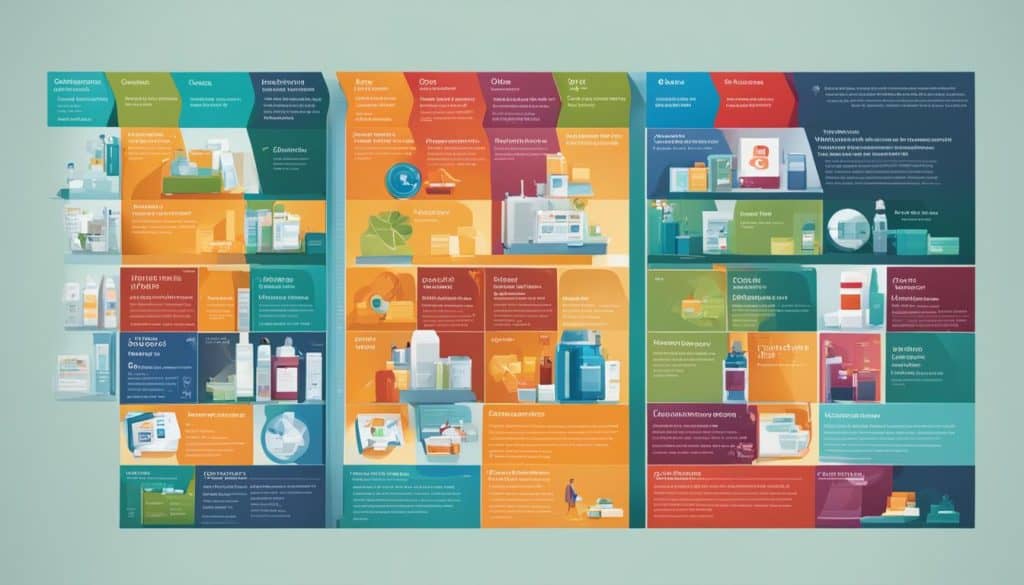When it comes to healthcare in the United States, you may have heard the terms ‘Medicare’ and ‘Medicaid’ used interchangeably. However, while they share similarities in providing healthcare coverage, they are two distinct government healthcare programs with significant differences that you need to be aware of.
Understanding these differences is crucial to determine which program you may qualify for and what benefits and services you may receive. In this article, we will explore the differences between Medicare and Medicaid, their eligibility criteria, benefits, and coverage options to help you make informed decisions about your healthcare coverage needs.
Key Takeaways
- Medicare and Medicaid are two healthcare programs created by the government.
- While they provide healthcare coverage, they serve different populations and have distinct eligibility criteria, benefits, and coverage options.
- Medicare primarily provides healthcare coverage for individuals aged 65 and older and those with certain disabilities.
- Medicaid provides healthcare coverage for low-income individuals and families, pregnant women, children, and individuals with disabilities.
- Consulting with an independent Medicare insurance broker like Integrity Now Insurance Brokers can provide expert guidance to help navigate the system effectively.
What is Medicare?
Medicare is a federal health insurance program primarily for individuals aged 65 and older, as well as those with certain disabilities. It provides coverage for various healthcare costs, including hospital stays, doctor visits, prescription drugs, and preventive services. Depending on your needs, Medicare offers different parts to choose from (A, B, C, and D), each with its own coverage options, premiums, and copayments.
Medicare eligibility is based on age and work history. If you or your spouse worked and paid Medicare taxes for at least ten years, you are likely eligible for Medicare when you reach age 65. However, some individuals may be eligible earlier if they have certain disabilities or conditions.
It is important to note that while Medicare provides substantial coverage, it does not cover all healthcare costs. You may still be responsible for deductibles, copayments, and other expenses. Therefore, some individuals choose to enroll in additional Medicare Advantage or Medigap plans to supplement their coverage.
Medicare Parts:

| Part | Description |
|---|---|
| Part A | Covers inpatient hospital stays, skilled nursing facility care, hospice care, and home health care. |
| Part B | Covers outpatient medical services, doctor visits, preventive services, and medical equipment. |
| Part C | Also known as Medicare Advantage, it offers combined coverage for Parts A, B, and sometimes D, through private insurance companies. |
| Part D | Covers prescription drug costs for individuals with Original Medicare, and it is also available as part of a Medicare Advantage plan. |
Understanding the different parts of Medicare can help you choose the coverage options that best suit your healthcare needs and budget. It is also important to note that Medicare is a government-run program, and it is subject to changes in its regulations and policies. Therefore, it is recommended to stay informed and seek expert guidance from an independent Medicare insurance broker, like Integrity Now Insurance Brokers, to navigate Medicare effectively and make informed decisions.
What is Medicaid?
Medicaid is a joint federal and state program that provides health coverage for low-income individuals and families. Unlike Medicare, Medicaid eligibility is based on income and other factors, and it covers a broader range of healthcare services, including doctor visits, hospital stays, long-term care, and more.
Medicaid is administered by states under federal guidelines, resulting in coverage variations across different regions. The program serves as a safety net for many families who would otherwise be unable to afford healthcare costs. Moreover, it provides access to crucial medicaid and medicare benefits and services for those in need.
As with Medicare, navigating Medicaid can be complicated, and there are specific eligibility criteria that must be met. However, the program can make a significant difference in the lives of millions of Americans who would otherwise have limited access to the healthcare services they need.

Medicaid Eligibility Criteria by State
| State | Income Level | Household Size | Age |
|---|---|---|---|
| California | 0 to 65 | ||
| Texas | 0 to 65 | ||
| Florida | 0 to 65 | ||
| New York | 0 to 65 | ||
| Ohio | 0 to 65 |
Medicaid is vital for low-income individuals and families as it offers comprehensive healthcare coverage that caters to their medical needs. The program’s eligibility criteria are essential to understand, as they can vary from one state to another. Speak with our independent Medicare Insurance Broker, and expert in determining Medicaid eligibility and the enrollment process in your state.
Benefits and Coverage of Medicare
Medicare is a federal health insurance program that provides a range of coverage options to eligible individuals. With Medicare, you can expect to receive medical care when you need it the most.
There are four parts to Medicare coverage:
| Part | Coverage |
|---|---|
| Part A | Covers inpatient hospital care |
| Part B | Covers outpatient medical services and doctor visits |
| Part C | Offers Medicare Advantage plans that combine Parts A, B, and sometimes D |
| Part D | Covers prescription drugs |
The specific benefits and costs vary depending on the selected plan and coverage options. It is up to you to decide between Original Medicare and Medicare Advantage so that you can select the option that best suits your needs.
With the assistance of an independent Medicare insurance broker like Integrity Now Insurance Brokers, you can compare Medicare and Medicaid coverage options available to you and choose the right program based on your eligibility, needs, and budget.

Benefits and Coverage of Medicaid
Medicaid is a crucial program that provides comprehensive healthcare coverage for millions of low-income individuals, families, pregnant women, children, and individuals with disabilities. The program covers a broad range of healthcare services, including:
- Doctor visits
- Hospital stays
- Lab tests
- Prescription drugs
- Mental health services
- And more
Medicaid also offers specific services for children, pregnant women, and individuals with disabilities, such as home and community-based services and nursing home care. The specific benefits and services covered by Medicaid are determined by each state’s Medicaid program, and they may differ from state to state.
Working with an independent Medicare insurance broker, like Integrity Now Insurance Brokers, can help you navigate the complexities of Medicare and Medicaid programs and select the right plan for your healthcare needs.

As with any healthcare decision, it’s essential to approach choosing a plan with careful consideration. Failing to understand the differences between Medicare and Medicaid programs and their benefits could lead to uninformed decisions, inadequate coverage, and unexpected costs.
Choose Integrity Now Insurance Brokers for top-quality, expert guidance, and ensure that you receive access to the best healthcare coverage options available. With their support and experience, you can make well-informed decisions and feel confident in your healthcare choices.
Conclusion
In conclusion, understanding the differences between Medicare and Medicaid is crucial to ensure you choose the appropriate program that meets your healthcare needs. While both programs provide healthcare coverage, their eligibility criteria, benefits, and coverage options differ.
It is essential to determine your eligibility for Medicare and Medicaid and understand the enrollment periods, coverage options, and nuances associated with each program. Consulting with an independent Medicare insurance broker like Integrity Now Insurance Brokers can provide expert guidance to navigate Medicare and Medicaid effectively.
Whether you are seeking Medicare or Medicaid coverage, the goal is to access the best healthcare coverage for your situation. By understanding the differences between these programs and consulting with an independent Medicare insurance broker, you can make informed decisions that support your healthcare needs.
Choose the right program or combination of programs that suit your circumstances and access the healthcare coverage you deserve with Medicare or Medicaid.
Integrity Now Insurance Brokers is an independent Medicare insurance broker that can help you navigate these programs with ease. Contact us today to learn more.
FAQ
Is Medicare And Medicaid The Same Thing?
No, Medicare and Medicaid are not the same thing. They are two separate government healthcare programs in the United States. Medicare is a federal health insurance program primarily for individuals aged 65 and older, as well as those with certain disabilities. On the other hand, Medicaid is a joint federal and state program that provides health coverage for low-income individuals and families.
What is Medicare?
Medicare is a federal health insurance program primarily for individuals aged 65 and older, as well as those with certain disabilities. It helps cover healthcare costs such as hospital stays, doctor visits, prescription drugs, and preventive services. Medicare eligibility is based on age and work history, and it has different parts (A, B, C, and D) that provide various coverage options.
What is Medicaid?
Medicaid is a joint federal and state program that provides health coverage for low-income individuals and families. Unlike Medicare, Medicaid eligibility is based on income and other factors, and it covers a broader range of healthcare services, including doctor visits, hospital stays, long-term care, and more. Medicaid is administered by states under federal guidelines, resulting in coverage variations across different regions.
What is the eligibility for Medicare?
To be eligible for Medicare, you must be a U.S. citizen or a legal permanent resident for at least five years. Most people qualify for Medicare at age 65, and some individuals may be eligible earlier if they have certain disabilities or conditions. Enrollment in Medicare typically occurs during specific enrollment periods, such as the Initial Enrollment Period (IEP) and the General Enrollment Period (GEP).
What is the eligibility for Medicaid?
Medicaid eligibility varies by state, but generally, it covers low-income individuals, families, pregnant women, children, and individuals with disabilities. Qualification requirements may include income level, household size, age, pregnancy status, or disability status. Each state sets its own guidelines and processes for Medicaid enrollment, so it’s important to check the specific criteria in your state.
What are the benefits and coverage of Medicare?
Medicare coverage is divided into four parts: Part A covers inpatient hospital care, Part B covers outpatient medical services and doctor visits, Part C offers Medicare Advantage plans that combine Parts A, B, and sometimes D, and Part D covers prescription drugs. The specific benefits and costs vary depending on the selected plan and coverage options, and individuals can choose between Original Medicare or Medicare Advantage.
What are the benefits and coverage of Medicaid?
Medicaid provides comprehensive healthcare coverage, including doctor visits, hospital stays, lab tests, prescription drugs, mental health services, and more. It also offers specific services for children, pregnant women, and individuals with disabilities. The covered benefits and services are determined by each state’s Medicaid program, and they may differ from state to state.
How can I navigate Medicare and Medicaid?
Understanding the differences between Medicare and Medicaid can ensure that you choose the right program based on your eligibility and healthcare needs. It is also essential to be aware of the enrollment periods, coverage options, and other nuances to make informed decisions. Consulting with an independent Medicare insurance broker, like Integrity Now Insurance Brokers, can provide expert guidance to navigate Medicare and Medicaid effectively.
What is the conclusion about Medicare and Medicaid?
In conclusion, while Medicare and Medicaid have similarities in providing healthcare coverage, they serve different populations and have distinct eligibility criteria, benefits, and coverage options. The key is to understand your eligibility, healthcare needs, and choose the appropriate program or combination of programs that suit your circumstances. Remember to consult an independent Medicare insurance broker to ensure you make informed decisions and access the best healthcare coverage for your situation.










